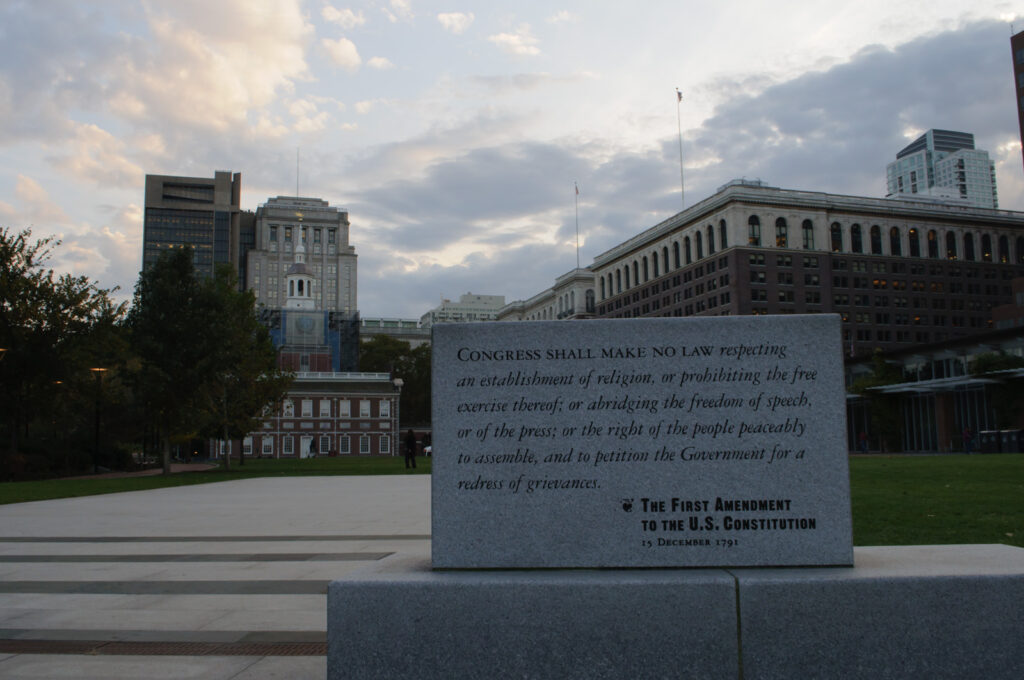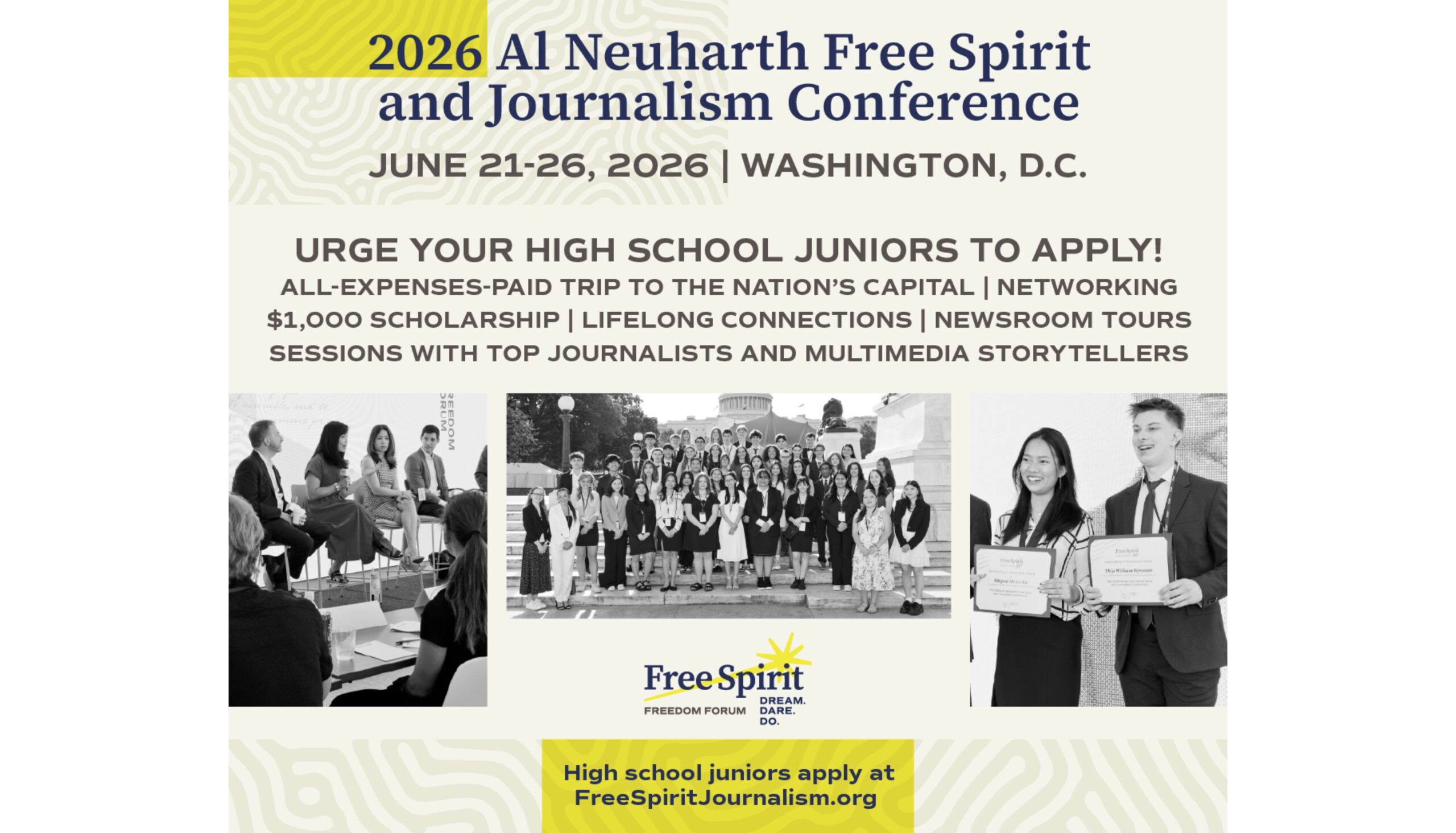
Photo was taken by InSapphoWeTrust from Los Angeles, California, USA. This file is licensed under the Creative Commons Attribution-Share Alike 2.0 Generic license.
The day after Charlie Kirk was killed at Utah State, a few students in one of my classes asked for my thoughts.
And while a number of people in and out of my district would say it’s inappropriate for me to answer that question – too controversial – I answered it. Because it is very much relevant to what we cover in journalism classes.
I told them I was worried about the potential chilling effect this would have on speech. What does the future of discourse look like when political figures on both sides of the aisle are being attacked or murdered for their views?
And I reminded them the First Amendment protects speech we don’t like – even speech we find repugnant or hateful. I added I felt it was vital to our society, especially in times like these, because our experiences and beliefs dictate what speech we find acceptable.
They actually independently connected that last bit to some recent legislation in Texas that affects student expression and the concept clicked for them – which I found impressive, because I didn’t really appreciate the extent of the First Amendment when I was a teenager. After I made some bland statement about how I felt it was important that we respect others’ right to have different views, we moved on from that conversation.
In the last week, as students and instructors alike have been dismissed from institutions or disciplined for speech and multiple state education agencies – including my own – have promised to investigate teachers for sharing “reprehensible and inappropriate content” on social media. A few hours before I started writing this, ABC pulled “Jimmy Kimmel Live” for a week. I didn’t think I’d see those chilling effects so soon, to be honest.
There have been a number of times this year I have felt grossly unprepared to teach my students about the First Amendment or answer questions. I also know there are a lot of smart people in scholastic journalism who are also having these conversations. So I reached out to a few to share how they’re tackling these topics with their students.
Stephen Green, CJE
I had a kid ask me why someone could get fired over the Charlie Kirk poster situation, and it turned into a pretty good discussion. He thought it was crazy that they could get fired, and that they could have refused to print it. I explained that the First Amendment protects people from the government, not from private companies. In Michigan, an Office Depot manager refused to print posters for a vigil honoring Kirk, calling them “propaganda.” The customer filmed it, the video blew up online and managers quickly fired the employee. The student assumed this was a free speech issue, but it wasn’t. I reminded him that it is because Office Depot isn’t the government. Additionally, because Office Depot is a private business that sells printing services, it can decide what it will or won’t produce. If the company chose to side with its employees and refuse the job, that would’ve also been their right.
Students and the public often miss the difference between the two and lump them together. If the government punished someone for making or refusing to make those posters, that would raise First Amendment concerns. But in this case, the employer was a private business with its own rules and values. The company decided the employee’s behavior violated policy, so they let them go. The Constitution doesn’t step in there outside of any civil rights violations, which this didn’t tread into. I explained that the story MAY sound like censorship, but, legally, it’s just workplace discipline from a private employer (assuming that censorship is being defined traditionally as government interference in speech).
Kristin Taylor, MJE
I’m in a very privileged situation, I know, with a supportive administration and free press. We talked about how they were thinking and feeling the morning after, especially since many of them saw the graphic footage before it was taken down. Since we are in a very liberal area, I focused my discussion around violence in response to speech and how it’s easy to have sympathy for someone you agree with and condemn their murder, but it is harder when you didn’t agree with that perspective. Some shared how disturbed they were by some of their friends celebrating his death and said they were focused on him being a person with a family; others said they don’t approve of violence but couldn’t feel upset he was gone. Lots of strong opinions and emotions. It was a hard, but good, conversation.
My news editor did cover it. Here’s that piece.
Julia Satterthwaite, MJE
We’ve gone around and around about it — even considered a staff editorial about it, but the EICs redirected when they realized there were some pretty contrasting opinions on staff. I’ve been impressed by the maturity of the student leaders guiding the staff through the nuances in conversation and where they landed in terms of what they plan to write. Our district had principals deliver a controversial topic presentation before school started about limits to teacher free speech that seemed to stem primarily over concerns from last year related to Israel and Palestinian families. Parents can also request to opt out of LGBTQ+ texts now, though that seems like it will be a very small minority (maybe one or two families districtwide?), but conservative issues are even touching us in the Bay Area.
While no one person has all of the answers — or can even say the best way to handle every single school or staff’s situation — one thing I have learned in my career is the value of conversations with colleagues. And having these conversations on social media right now can also feel quite risky. So the SPLC and SPRC are here to help. We’ll be hosting a webinar on Oct. 23 at 7 p.m. EST for advisers to come talk about teaching these difficult topics. This will be an off-the-record conversation — no recording will be available after. Advisers who are worried about sharing their concerns may submit their questions ahead of time so they can be kept anonymous. Register at this link.



